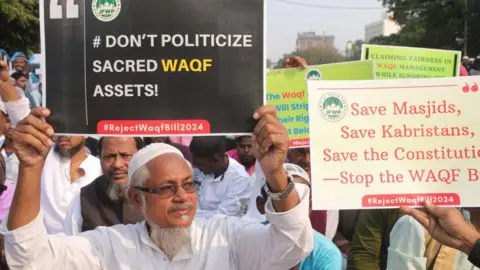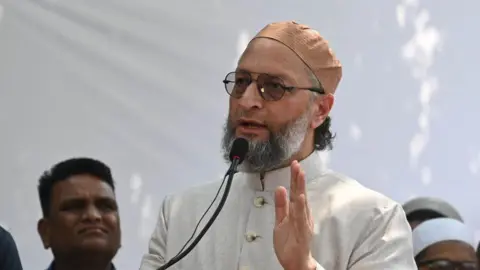India passes controversial bill on Muslim properties after fierce debate
 Getty Images
Getty ImagesAfter hours of heated debate, India's parliament has passed a controversial bill that seeks to change how properties worth billions of dollars donated by Muslims over centuries are governed.
The upper house passed the Waqf (Amendment) Bill, 2024 early on Friday, a day after the lower house cleared it amid strong opposition criticism.
Muslim leaders and opposition parties say the bill is "unconstitutional" and infringes on the rights of India's Muslim-minority community.
But the government says the bill aims to make the management of waqf (Muslim properties) more transparent.
The bill will now be sent to India's president for her assent before it becomes law. This approval is expected to come soon.
Prime Minister Narendra Modi called the passing of the bill a "watershed moment".
In a post on X, he said the waqf system [the system of governing waqf or Muslim properties] had been "synonymous with a lack of transparency and accountability" for decades.
"The legislation passed by parliament will boost transparency and also safeguard people's rights," he wrote.
However, the opposition has been vociferous in their condemnation of the bill and allege that it is another ploy by the governing Bharatiya Janata Party (BJP) to dilute the rights of minorities.
Congress leader Mallikarjun Kharge noted that while 288 members voted in favour of the bill in the lower house, a significant 232 opposed it.
"From this, we can guess that despite opposition from various parties, this bill was brought arbitrarily," he wrote on X.
Legal website LiveLaw reported on Friday that lawmaker Asaduddin Owaisi, president of the All India Majlis-e-Ittehadul Muslimeen party and a fierce critic of the bill, had challenged it in the Supreme Court.
 Getty Images
Getty ImagesWhat is waqf property and why does the government want to change how it's managed?
In Islamic tradition, a waqf is a charitable or religious donation made by Muslims for the benefit of the community. Such properties cannot be sold or used for any other purpose.
They are important to India's 200 million Muslims as they are used for mosques, madrassas, graveyards and orphanages.
The properties are governed by the Waqf Act, 1995, which mandated the formation of state-level boards to manage them.
These boards include nominees from the state government, Muslim lawmakers, members of the state bar council, Islamic scholars and managers of waqf properties.
Last August, the BJP government introduced a bill to amend the Waqf Act.
The government said the changes proposed by the bill would modernise waqf administration and reduce legal loopholes. But Muslim leaders and opposition parties alleged that the amendments would give the government more control over these properties.
The bill was sent to a panel for scrutiny. In February, the panel cleared the bill with some amendments.
What are the key changes in the new bill that have caused a row?
For one, the new bill proposes changes to how a waqf property is determined.
Historically, many properties that were donated through oral declarations or community customs have been legitimised as waqf properties because of their continuous use by the Muslim community.
Under the new bill, Waqf boards must provide valid documents to claim a property as waqf. In case of disputes - particularly over land deemed government-owned -the final decision will rest with the government.
Secondly, the bill proposes allowing non-Muslims to be appointed on waqf boards and tribunals.
The bill also allows for judicial intervention in disputes - replacing the earlier system where decisions by waqf tribunals were considered final.
The bill also proposes a centralised registration system, requiring all waqf properties to be registered within six months of the law coming into effect.
Requests for new registrations of waqf properties also need to be submitted to waqf boards via this system.
The bill also has provisions that give the government a greater role in surveying of waqf properties.
